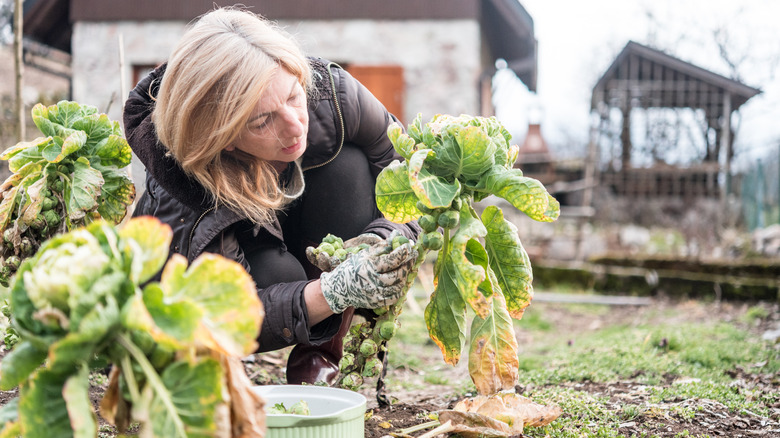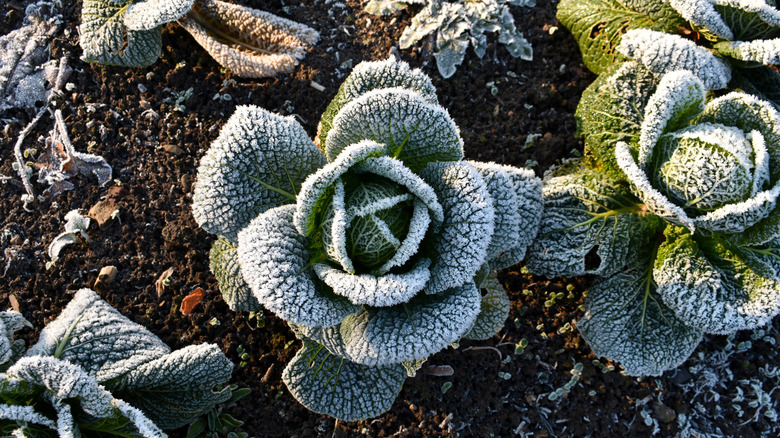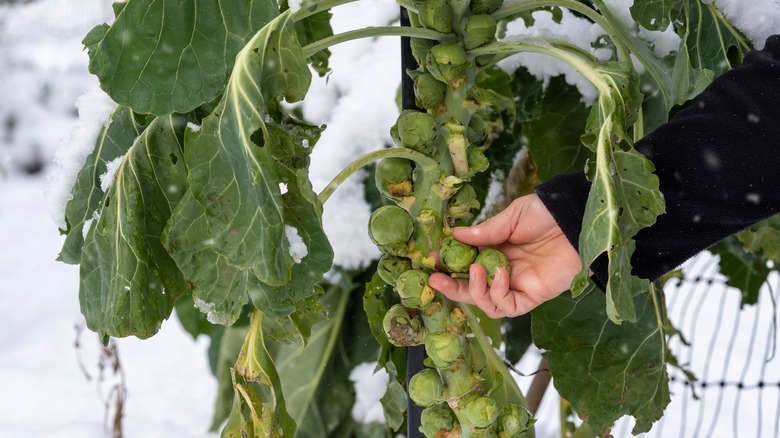Vegetables To Plant In Winter For An Early Pop Of Spring Color
If you're an avid gardener, the idea of waiting an entire season to get back to your hobby sounds about impossible. Luckily, there are several vegetables that you can sow in the winter and that will be peaking up come springtime, so you can already see some of the color and magic of newly grown plants in your garden before the temperatures have fully warmed up.
While preparing your garden for winter and planting new seeds, keep your surrounding climate in mind. If your area tends to have multiple hard freezes throughout the season, some of these may be better planted indoors. If you're growing them outside, try to use protective measures like row covers, cloches, or mulching to help provide extra insulation and protection for cold-sensitive plants. While selecting your vegetable species, look for terms like "winter," "cold-hardy," or "frost-resistant" in their names or descriptions. It's also key to adjust your garden tending habits when growing vegetables in the winter. These plants will be receiving far less sun and warm temperatures, so they probably won't need as much water as spring and summer crops. But winter can be especially dry, and freezes can prevent water from reaching the roots, so keeping the soil moist is essential. Pay special attention to the garden and how it reacts to certain conditions. It's best to accept that a bit of trial and error is to be expected and totally normal. Now, onto the veggie types you can plant this winter.
Get leafy with it
Dark green vegetables seem to do quite well, as many are cold-tolerant and some even frost-tolerant. Kale is known for its cold-hardiness and its tolerance to freezing temperatures. In fact, some gardeners find that a touch of frost can improve the flavor of kale. This is due to an impressive bit of science: according to Constructor University, "At cold temperatures, the plant transforms complex carbohydrates in its cell walls into smaller sugar molecules." While this quote refers specifically to kale, this has also been said of spinach and cabbage. That means, so long as the freezing temps don't kill the plant out entirely, the colder the sweeter. As to which varieties look for, Winterbore or Redbor kale, Giant Winter spinach, and Tundra cabbage.
Two less common leafy veggies you can plant in the winter are collard greens and chard. Collard greens and chard are both frost-tolerant, do quite well in the winter, and can add plenty of verdant color to the garden. Unfortunately, as lovely as the colors of rainbow chard are, you're best off sticking with a white stem variety, per the Royal Horticultural Society, as these are heartier and have a better chance at survival while overwintering.
From roots to sprouts
While the leafy greens are often the first plants you'll hear about planting in the winter, there are other types to consider. One of our favorites is radishes — these spicy little root veggies do quite well in the winter, so long as you know which kind to plant. Find a seed variety that describes itself as a winter variety or freeze-tolerant; these types of radishes can survive hard freezes with temperatures in the mid-low 20s, and experts say that even if the plant sustains damage during a freeze, radishes are resilient and can regrow from the root. You may also have success with daikon radishes, which are heartier and larger than the little red radishes most of us are used to, but equally freeze-tolerant.
Brussels sprouts are another lovely addition to a winter garden, and their unique stalks are stunning and unique amongst the foliage. However, these sprouts are heat-sensitive, so you don't want to have them growing too late into early spring. For this reason, you want sprouts with a shorter growing season, such as Churchill or Jade Cross. Another plus of allowing sprouts to grow through cold temperatures is that similar to their leafy friends, they become sweeter with cold exposure, which helps to eliminate some of the bitterness many of us associate with the plant. By planting these cold-tolerant veggies, you never have to give up your green thumb in the winter.


